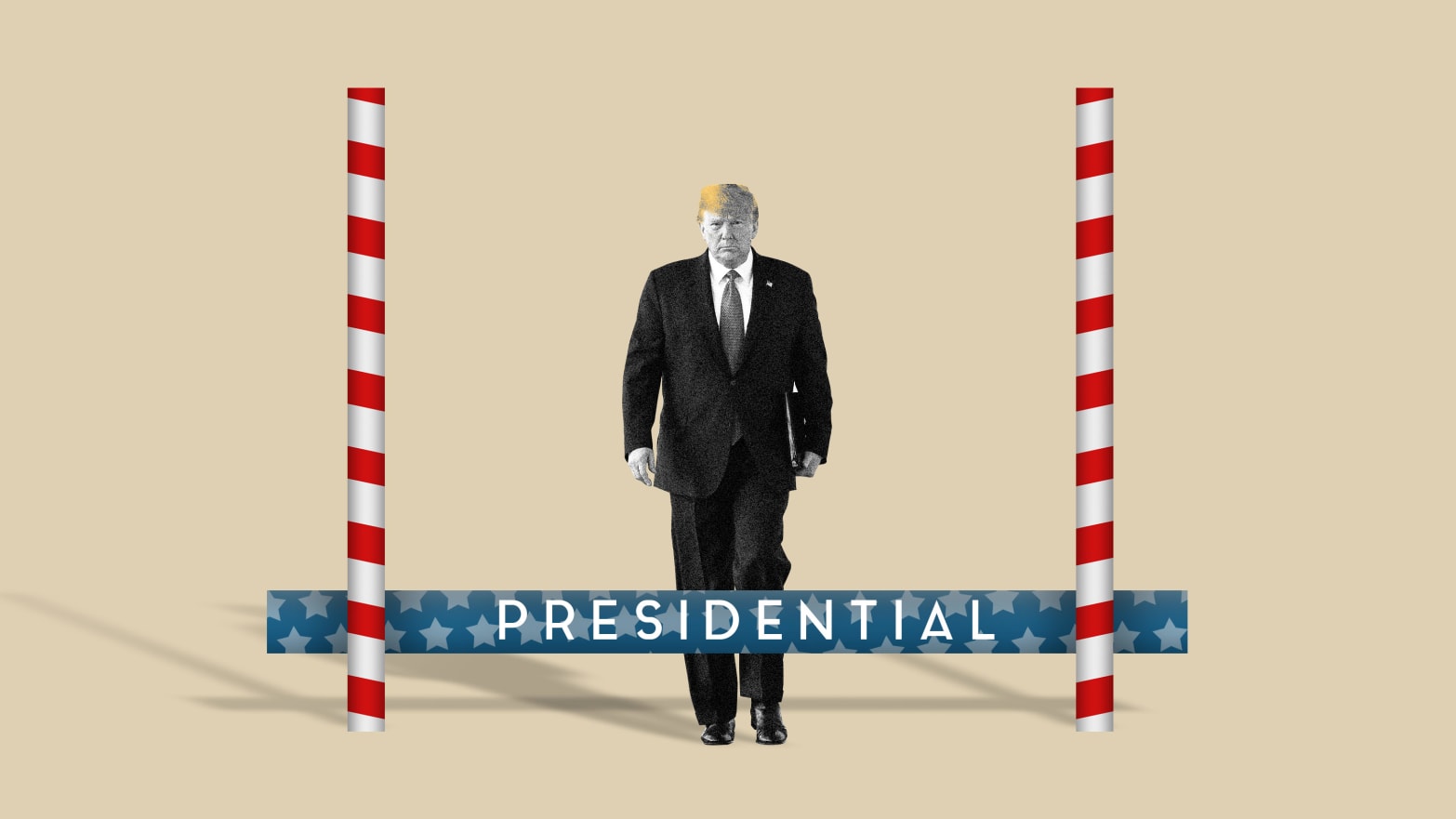As evening fell on Tuesday, President Donald Trump did what he’s done virtually every day for the past few weeks: He went to the White House briefing room to talk to gathered reporters about the coronavirus. Only this time, things were atmospherically different. The president wasn’t dismissive of the pandemic. He wasn’t overly self-congratulatory. He didn’t talk about the country going back to work in a few weeks.
Instead, he was generally somber and even dour, acknowledging that under best-case scenarios the country would likely experience more than 100,000 coronavirus-related deaths.
Afterward, the press noted the difference in “tone,” with several pundits and reporters speculating that the gravity of the moment was finally weighing on the man in the Oval Office. And Trump, three aides and allies tell The Daily Beast, almost assuredly noted the praise he received from them for his more “presidential” tune. That’s because, they say, there is no one who more voraciously consumes media coverage of himself. And over the past three years, the president has periodically remarked—sometimes with a self-aware chuckle or smirk—about how “easy” it is for him to trigger praise from a typically adversarial press simply by acting “nice” during a particularly weighty moment.
“It’s so easy, can you believe it?” the president said during a dinner at the White House in early 2017, according to a source who was in the room at the time. “All I had to do was be a little nice… and do something beautiful [and now they’re] saying all these terrific things about Trump.”
During that conversation, Trump was referring to several high-profile TV personalities who usually were highly critical of him, but who were suddenly being “fair” to him for a news cycle, the source recalled. The dinner took place not long after the president addressed a joint session of Congress in February 2017 for the first time since his inauguration. During his speech, Trump honored the widow of a Navy SEAL who was killed in Yemen, in a nationally televised moment that was heralded as emotionally moving.
“He became president of the United States in that moment, period,” liberal commentator Van Jones said on CNN at the time. “That thing you just saw him do, if he finds a way to do that over and over again, he’s going to be there [in office] for eight years.”
By early March 2017, Trump was already tweeting about how “Terrible!” it was that President Barack Obama “had my ‘wires tapped’ in Trump Tower just before the victory”—an accusation that, not surprisingly, turned out to not be true.
Trump’s occasional turn towards acting sober-minded has been a long-standing feature of his attempts to drive media coverage, those who have worked alongside him say. He is acutely aware that one of the things that keeps viewers interested in what he has to say is if the programming he provides remains unpredictable. And so, he occasionally changes the script.
His former aide, Sam Nunberg, recalled how during the 2016 presidential campaign, Trump was shown an article calling on him to demonstrate how compassionately he’d treated employees, as a means of dispensing with the veneer of a heartless businessman. “I showed it to him and he said, ‘I don't want to do that now. I will do it later,’” Nunberg said. “And, sure enough, he did it later. He gave employee testimonials.”
“No one follows their own media more than the president,” Nunberg added. “He's a creature of publicity. He's sophisticated on the nuance of settings, narratives, and audiences.”
Nunberg cautioned against assuming that Tuesday’s sober-minded showing was contrived as a means of manipulating the press. “You don't know what he sees behind the scenes,” he proclaimed. But he did concede that the president was applying a strategy of maximum media saturation in order to bolster his standing amid the coronavirus pandemic.
Indeed, over the last month, Trump has been ubiquitous on TV, holding court for often an hour-plus every day as the press volleys questions at him and his cadre of advisers. Both he and his campaign have not disputed the notion that these sessions are helpful politically. Trump has tweeted about the ratings he’s drawn and his campaign even ran an internal poll that asked respondents if they were watching the briefings (84 percent said yes, according to the numbers released by the re-election team). Allies have been delighted, too.
“This has been a huge win for him in so many different aspects,” said Sean Spicer, Trump’s first White House press secretary, who attended one of the briefings—and asked the president a question—as a newly crowned member of the press corps. “He gets to get out there and commands this audience and, at the same time, be presidential. It’s not just you alone, you’re with all these top government folks standing behind you. I just don’t think it could be any better.”
The admission that these briefings are political—and the routine disinformation that the president has put forward—has prompted criticism of cable news channels for airing them live. And some, indeed, have begun to dip in and out. But often, one of the key pieces of push back to that critique has been that occasionally there is actual news being made.
That certainly was the case on Tuesday when Trump and his task force acknowledged that 100,000 to 240,000 Americans could end up dying from the virus, called for more comprehensive public safety protocols, and downplayed comparisons to the flu. Afterwards, a number of journalists took to the airwaves and to social media to give the president a pat on the back for, in essence, acknowledging the grim reality around him.
“Trump sounding different today,” New York Times investigative reporter Eric Lipton tweeted. “Scale of death appears to have changed his tone, at least,” he added. NBC News’ Kelly O’Donnell, meanwhile, noted that Trump had adopted a “low key, measured tone that is not his usual demeanor” while quoting the president calling the virus “a plague.” Hours after the presser ended, CNN’s chief White House correspondent Jim Acosta—who has a lengthy history of made-for-TV altercations with the president and his staff—appeared on anchor Anderson Cooper’s primetime broadcast to praise a “different” Trump.
“I think he gets it, Anderson,” the CNN correspondent concluded to a skeptical-sounding Cooper.
Acosta wasn’t the only one on CNN who came away impressed by the president’s new tone. Anchor Erin Burnett noted on Tuesday evening that “it was a very sober president that we saw” while applauding him for not engaging so much in his typical verbal tussles and petty squabbles with the White House press corps.
“And, again, taking question after question, even from reporters he doesn’t like to take questions from,” she added. “On this point, talking about a friend of his who is now in a coma because of coronavirus and saying, emphatically saying, this is not the flu.” Burnett went on to point out that the president has repeatedly compared COVID-19 to the common flu until very recently.
Trump’s Tuesday presser didn’t just leave a mark on cable news either. Popular ABC talk show The View kicked off Wednesday’s broadcast by applauding the president for his “more serious tone.”
“It’s nice to know that he’s caught up with the rest of the country because while everyone has been, you know, at home trying to cope with all of this, we have been aware that it’s going to be a tough time ahead,” said co-host Whoopi Goldberg. “Is this the honest account that we’ve needed to hear from him from the start?”
Left out of much of the commentary was any acknowledgment of the substantive policies the administration was simultaneously pursuing, including reports that it would not re-open the health insurance markets for those who had lost their jobs because of the coronavirus outbreak. Nor was it mentioned that Trump’s tonal shift was not the first one he’d had around the coronavirus pandemic that month. After the president acknowledged that the deadly virus was a legitimate crisis in mid-March, CNN’s top political correspondent Dana Bash proclaimed that Trump was becoming the “leader” that America needed.
“If you look at the big picture, this was remarkable from the president of the United States,” she said on March 17. “This is a nonpartisan, important thing to note and to applaud from an American standpoint and from a human standpoint.”
The following week, Trump was lashing out at Democratic governors in hard-hit states, claiming they didn’t “need” the number of ventilators and life-saving equipment that had been requested, and insisting that “they have to treat us well, too,” when asking for critical medical supplies.



